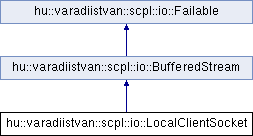#include <LocalClientSocket.h>
Inheritance diagram for hu::varadiistvan::scpl::io::LocalClientSocket:

Public Member Functions | |
| LocalClientSocket (const char *name, Waiter *waiter=0, size_t readingCapacity=DEFAULT_CAPACITY, size_t writingCapacity=DEFAULT_CAPACITY) | |
| LocalConnector & | getConnector () |
 Public Member Functions inherited from hu::varadiistvan::scpl::io::BufferedStream Public Member Functions inherited from hu::varadiistvan::scpl::io::BufferedStream | |
| virtual | ~BufferedStream () |
| ReadingBuffer & | getReadingBuffer () |
| WritingBuffer & | getWritingBuffer () |
 Public Member Functions inherited from hu::varadiistvan::scpl::io::Failable Public Member Functions inherited from hu::varadiistvan::scpl::io::Failable | |
| Failable () | |
| bool | failed () const |
| errorCode_t | getErrorCode () const |
| void | repair () |
Additional Inherited Members | |
 Static Public Attributes inherited from hu::varadiistvan::scpl::io::BufferedStream Static Public Attributes inherited from hu::varadiistvan::scpl::io::BufferedStream | |
| static const size_t | DEFAULT_CAPACITY = 4096 |
 Protected Member Functions inherited from hu::varadiistvan::scpl::io::Failable Protected Member Functions inherited from hu::varadiistvan::scpl::io::Failable | |
| void | setErrorCode (errorCode_t ec) |
Detailed Description
Client socket that connects to a server socket locally. On Linux it is a Unix socket, on Windows it is a named pipe.
The server socket's name should be given.
Definition at line 51 of file LocalClientSocket.h.
Constructor & Destructor Documentation
◆ LocalClientSocket()
| hu::varadiistvan::scpl::io::LocalClientSocket::LocalClientSocket | ( | const char * | name, |
| Waiter * | waiter = 0, |
||
| size_t | readingCapacity = DEFAULT_CAPACITY, |
||
| size_t | writingCapacity = DEFAULT_CAPACITY |
||
| ) |
Construct the client socket with the given name.
- Parameters
-
name the name of the server socket waiter the waiter to use for waiting a possible event occuring on the socket. If given, the socket will be non-blocking. Otherwise, it will be blocking, and the connect() function of the Connector might block as well as the reading and writing buffers. readingCapacity the capacity of the reading buffer writingCapacity the capacity of the writing buffer
Member Function Documentation
◆ getConnector()
| LocalConnector& hu::varadiistvan::scpl::io::LocalClientSocket::getConnector | ( | ) |
Get the connector. Use this object to connect to another socket.
The documentation for this class was generated from the following file: